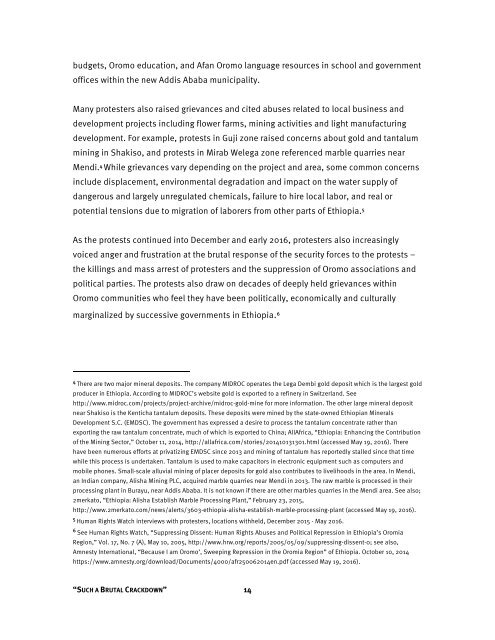“Such a Brutal Crackdown”
ethiopia0616web
ethiopia0616web
You also want an ePaper? Increase the reach of your titles
YUMPU automatically turns print PDFs into web optimized ePapers that Google loves.
udgets, Oromo education, and Afan Oromo language resources in school and government<br />
offices within the new Addis Ababa municipality.<br />
Many protesters also raised grievances and cited abuses related to local business and<br />
development projects including flower farms, mining activities and light manufacturing<br />
development. For example, protests in Guji zone raised concerns about gold and tantalum<br />
mining in Shakiso, and protests in Mirab Welega zone referenced marble quarries near<br />
Mendi. 4 While grievances vary depending on the project and area, some common concerns<br />
include displacement, environmental degradation and impact on the water supply of<br />
dangerous and largely unregulated chemicals, failure to hire local labor, and real or<br />
potential tensions due to migration of laborers from other parts of Ethiopia. 5<br />
As the protests continued into December and early 2016, protesters also increasingly<br />
voiced anger and frustration at the brutal response of the security forces to the protests –<br />
the killings and mass arrest of protesters and the suppression of Oromo associations and<br />
political parties. The protests also draw on decades of deeply held grievances within<br />
Oromo communities who feel they have been politically, economically and culturally<br />
marginalized by successive governments in Ethiopia. 6<br />
4 There are two major mineral deposits. The company MIDROC operates the Lega Dembi gold deposit which is the largest gold<br />
producer in Ethiopia. According to MIDROC’s website gold is exported to a refinery in Switzerland. See<br />
http://www.midroc.com/projects/project-archive/midroc-gold-mine for more information. The other large mineral deposit<br />
near Shakiso is the Kenticha tantalum deposits. These deposits were mined by the state-owned Ethiopian Minerals<br />
Development S.C. (EMDSC). The government has expressed a desire to process the tantalum concentrate rather than<br />
exporting the raw tantalum concentrate, much of which is exported to China; AllAfrica, “Ethiopia: Enhancing the Contribution<br />
of the Mining Sector,” October 11, 2014, http://allafrica.com/stories/201410131301.html (accessed May 19, 2016). There<br />
have been numerous efforts at privatizing EMDSC since 2013 and mining of tantalum has reportedly stalled since that time<br />
while this process is undertaken. Tantalum is used to make capacitors in electronic equipment such as computers and<br />
mobile phones. Small-scale alluvial mining of placer deposits for gold also contributes to livelihoods in the area. In Mendi,<br />
an Indian company, Alisha Mining PLC, acquired marble quarries near Mendi in 2013. The raw marble is processed in their<br />
processing plant in Burayu, near Addis Ababa. It is not known if there are other marbles quarries in the Mendi area. See also;<br />
2merkato, “Ethiopia: Alisha Establish Marble Processing Plant,” February 23, 2015,<br />
http://www.2merkato.com/news/alerts/3603-ethiopia-alisha-establish-marble-processing-plant (accessed May 19, 2016).<br />
5 Human Rights Watch interviews with protesters, locations withheld, December 2015 - May 2016.<br />
6 See Human Rights Watch, “Suppressing Dissent: Human Rights Abuses and Political Repression in Ethiopia’s Oromia<br />
Region,” Vol. 17, No. 7 (A), May 10, 2005, http://www.hrw.org/reports/2005/05/09/suppressing-dissent-0; see also,<br />
Amnesty International, “Because I am Oromo’, Sweeping Repression in the Oromia Region” of Ethiopia. October 10, 2014<br />
https://www.amnesty.org/download/Documents/4000/afr250062014en.pdf (accessed May 19, 2016).<br />
“SUCH A BRUTAL CRACKDOWN” 14


